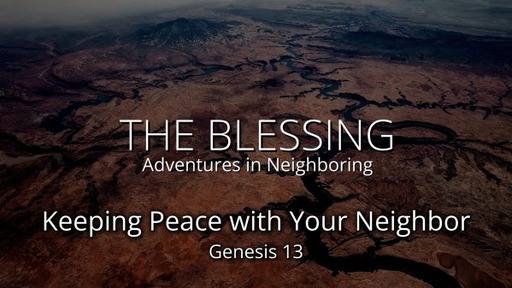Making Peace with Your Neighbor

Transcript Search
Notes
Transcript
Handout
Sermon Tone Analysis
A
D
F
J
S
Emotion
A
C
T
Language
O
C
E
A
E
Social
Abraham RECOMMITTED to God.
So Abram went up from Egypt to the Negev, with his wife and everything he had, and Lot went with him. Abram had become very wealthy in livestock and in silver and gold.
From the Negev he went from place to place until he came to Bethel, to the place between Bethel and Ai where his tent had been earlier and where he had first built an altar. There Abram called on the name of the Lord.
Abraham had NEIGHBORHOOD problems.
Now Lot, who was moving about with Abram, also had flocks and herds and tents. But the land could not support them while they stayed together, for their possessions were so great that they were not able to stay together. And quarreling arose between Abram’s herders and Lot’s. The Canaanites and Perizzites were also living in the land at that time.
Abraham valued peace over CONTROL.
So Abram said to Lot, “Let’s not have any quarreling between you and me, or between your herders and mine, for we are close relatives.
Abraham took a RISK to make peace.
Is not the whole land before you? Let’s part company. If you go to the left, I’ll go to the right; if you go to the right, I’ll go to the left.”
Lot chose CONTROL over peace.
Lot looked around and saw that the whole plain of the Jordan toward Zoar was well watered, like the garden of the Lord, like the land of Egypt. (This was before the Lord destroyed Sodom and Gomorrah.) So Lot chose for himself the whole plain of the Jordan and set out toward the east. The two men parted company:
Lot’s path set the stage for future TRAGEDY.
Abram lived in the land of Canaan, while Lot lived among the cities of the plain and pitched his tents near Sodom. Now the people of Sodom were wicked and were sinning greatly against the Lord.
God honored Abraham’s choice by CONFIRMING his blessing.
The Lord said to Abram after Lot had parted from him, “Look around from where you are, to the north and south, to the east and west. All the land that you see I will give to you and your offspring forever. I will make your offspring like the dust of the earth, so that if anyone could count the dust, then your offspring could be counted. Go, walk through the length and breadth of the land, for I am giving it to you.”
Abraham’s integrity and faith laid the foundation for FUTURE peace.
Loving Your Neighbor
Loving Your Neighbor
God’s people must care about MAKING and KEEPING peace.
But the wisdom that comes from heaven is first of all pure; then peace-loving, considerate, submissive, full of mercy and good fruit, impartial and sincere. Peacemakers who sow in peace reap a harvest of righteousness.
Hold them in the highest regard in love because of their work. Live in peace with each other.
“Salt is good, but if it loses its saltiness, how can you make it salty again? Have salt among yourselves, and be at peace with each other.”
Let the peace of Christ rule in your hearts, since as members of one body you were called to peace. And be thankful.
Finally, brothers and sisters, rejoice! Strive for full restoration, encourage one another, be of one mind, live in peace. And the God of love and peace will be with you.
If it is possible, as far as it depends on you, live at peace with everyone.
Blessed are the peacemakers,
for they will be called children of God.
God promises to support our peacemaking efforts.
Blessed are the meek,
for they will inherit the earth.
Blessed are those who hunger and thirst for righteousness,
for they will be filled.
Blessed are the merciful,
for they will be shown mercy.
Blessed are the pure in heart,
for they will see God.
Blessed are the peacemakers,
for they will be called children of God.
The Gospel has the power to bring peace to the worst conflicts.
For he himself is our peace, who has made the two groups one and has destroyed the barrier, the dividing wall of hostility, by setting aside in his flesh the law with its commands and regulations. His purpose was to create in himself one new humanity out of the two, thus making peace, and in one body to reconcile both of them to God through the cross, by which he put to death their hostility.